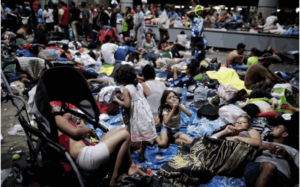Colombia’s 28 Congress Members Under Investigation for Corruption
Colombia to Investigate 28 Congress Members over Corruption Allegations
In a significant move, Colombia’s Attorney General’s Office is looking into allegations of corruption involving 28 members of Congress. This investigation has sparked widespread attention and concern, as it involves lawmakers from various political parties and raises questions about integrity in the nation’s governance. The focus is on suspicious contracts linked to infrastructure projects, and the implications of these allegations could be far-reaching for Colombia’s political landscape.
Key Takeaways
- 28 Congress members in Colombia are under investigation for alleged corruption.
- The inquiry is centered around questionable contracts awarded by the National Institute of Roads.
- Multiple political parties are implicated, raising concerns about broader systemic issues.
- Public and political reactions are mixed, with some calling for accountability and others defending the lawmakers.
- The investigation could influence upcoming elections and the overall political climate in Colombia.
Colombia’s Attorney General’s Office Investigates Congress Members Over Alleged Corruption Case

Overview of the Investigation
Alright, so here’s the deal. Colombia’s Attorney General is on a mission. They’ve asked the Supreme Court to kick off an investigation into 28 Congress members. Why? Well, it’s all about these shady contracts awarded by the National Institute of Roads, or Invias. This agency is supposed to handle infrastructure, but it seems like there might be some funny business going on.
The investigation is still in its early days, but it’s a big deal. They’re trying to figure out if there’s enough evidence to hit these lawmakers with formal charges. This could be a game-changer for Colombian politics.
Political Parties Involved
Now, let’s talk politics. This isn’t just about one party. Nope, it’s a mixed bag. Members from six different parties are in the hot seat. Here’s a quick rundown:
- Conservative Party: Juan Loreto Gómez, Daniel Restrepo, Wadith Manzur, Yamil Arana, and Juliana Aray Franco.
- Green Alliance: Olga Lucía Velásquez, Katherine Miranda, Wilmer Castellanos, and Elkin Rodolfo Ospina.
- Party of the U: Wilmer Ramiro Carrillo, Juan Diego Muñoz, and Milena Jaraba.
- Liberal Party: Carlos Alberto Peinado, Silvio José Carrasquilla, Álvaro Henry Monedero, Sandra Aristizábal, Kellyn Johana González, and Wilmer Yesid Guerrero.
- Radical Change: Néstor Leonardo Rico.
It’s like a political buffet, but not in a good way.
Potential Consequences for Lawmakers
So, what happens if these folks are found guilty? Well, it could get messy. Here are a few things that might go down:
- Some lawmakers could lose their seats. That’s a big deal in any country.
- There’s a chance this could shake up the balance of power in Congress. Imagine the chaos.
- And let’s not forget the public’s reaction. People aren’t going to be happy, and protests could be part of the picture.
The investigation into these Congress members is a reminder of the ongoing challenges Colombia faces with corruption. As the case unfolds, it’s clear that the country is grappling with significant issues that have the potential to reshape its political landscape. Corruption, delays, and backlogs continue to challenge Colombia, with high crime rates reported. In 2023, the Attorney General’s Office documented over 1.8 million crimes, highlighting ongoing security issues.
Details of the Allegations Against Congress Members
Suspicious Contracts Awarded
So, it seems like the Colombian Attorney General’s Office is on a mission. They’re looking into 28 members of Congress for some shady dealings. The focus? Contracts handed out by Invias, the National Institute of Roads. What were these contracts for? Infrastructure projects. But here’s the catch: they’re suspected of being awarded under some pretty suspicious circumstances. The investigation aims to uncover whether these contracts were granted in exchange for political favors or financial kickbacks. It’s a big deal because these aren’t just any contracts; they involve major public works that affect the whole country.
Testimonies from Key Witnesses
Now, about the witnesses. There’s a bunch of them ready to spill the beans. These are folks who’ve seen things firsthand and are now stepping up to share what they know. Their testimonies could make or break the case. Imagine being in their shoes, knowing that what you say could change everything. It’s intense. These witnesses are expected to provide details about how the contracts were negotiated and who was involved. Their stories might reveal a web of corruption that could go deeper than anyone thought.
Previous Corruption Cases in Colombia
Corruption isn’t new in Colombia. It’s been a thorn in the country’s side for years. Just think back to the Odebrecht scandal, where bribes were flying left and right. That one shook things up big time. And now, with this new case, it’s like history repeating itself. The public’s trust in politicians is already shaky, and cases like these don’t help. But maybe, just maybe, this investigation will lead to some real changes. People are hoping it will be different this time, that those involved will actually face consequences. It’s a wait-and-see situation, but the stakes are high.
Political Reactions to the Investigation
Statements from Political Leaders
Politicians from various parties have been quick to respond to the corruption investigation, each trying to distance their groups from the scandal. The Conservative Party emphasized their commitment to transparency, stating that any member found guilty should face the full force of the law. Meanwhile, the Green Alliance has called for a thorough and speedy investigation, urging the public not to rush to judgment until all facts are known. On the other hand, leaders from the Liberal Party have been more reserved, urging caution and highlighting the importance of due process.
Public Response and Protests
The public’s reaction has been a mix of anger and resignation. People are fed up with corruption, and this investigation has only added fuel to the fire. In major cities like Bogotá and Medellín, protests have erupted, with citizens demanding accountability and reform. Demonstrators have been holding signs and chanting slogans against corruption, calling for a complete overhaul of the political system. Despite the protests, some citizens remain skeptical, feeling that these investigations rarely lead to real change.
Impact on Upcoming Elections
With elections on the horizon, this scandal could significantly sway voter sentiment. Candidates are scrambling to adjust their campaigns, either distancing themselves from implicated colleagues or capitalizing on the issue to gain support. Some political analysts suggest that this could lead to a shift in power, particularly if voters decide to support smaller parties perceived as less corrupt. The scandal has also prompted discussions about potential reforms to prevent such issues in the future, though it’s unclear what changes, if any, will be implemented before the elections.
Historical Context of Corruption in Colombia

Previous Scandals and Their Outcomes
Colombia has a long and complicated history with corruption, dating back decades. The country has seen numerous scandals involving high-profile figures and public officials. One of the most notorious cases was the “Proceso 8.000” in the 1990s, where drug money was funneled into political campaigns, leading to the investigation of then-President Ernesto Samper. Despite the scandal, Samper completed his term, highlighting how difficult it can be to hold powerful figures accountable. Fast forward to more recent times, the MinTIC scandal in 2022 exposed how contracts were awarded based on manipulated documents, leading to significant legal actions.
Public Perception of Corruption
It’s no secret that Colombians have a deeply ingrained distrust of their political system. Surveys often show that a majority of citizens believe corruption is rampant. Public opinion has been shaped by repeated revelations of misuse of power and resources. According to a 2021 survey, over 60% of respondents felt that corruption had increased, with only a small fraction believing it had decreased. This perception is bolstered by frequent media reports and high-profile cases, though many local incidents remain underreported.
Legislative Measures Against Corruption
Colombia has attempted to tackle corruption through a robust legal framework. The country has implemented various laws and regulations, especially as part of its OECD accession process, to curb corruption. These include measures for greater transparency and accountability in both the public and private sectors. However, the effectiveness of these measures is often questioned due to loopholes and the ability of powerful elites to evade justice. The 2022 anti-corruption law, for example, aimed to enhance corporate accountability but its impact remains to be seen. Despite these efforts, the fight against corruption continues to be an uphill battle.
Implications for Colombia’s Political Landscape
Shift in Power Dynamics
Colombia’s political scene is undergoing a significant transformation. With the ongoing corruption investigation, some of the traditional power players may find themselves on shaky ground. New political forces might emerge, potentially altering the balance of power within the government. Historically, the Liberal and Conservative parties have dominated, but recent years have seen a rise in centrist and left-wing parties. This shift is partly due to the 2016 peace agreement which allowed more diverse political voices to gain traction.
Impact on Legislative Agenda
The corruption scandal is likely to slow down the legislative process. Lawmakers might become more cautious, fearing further scrutiny. There’s a chance that some proposed bills, especially those related to economic reforms and social policies, could be delayed or even shelved. On the flip side, this situation might push for stronger anti-corruption measures. The public’s demand for transparency and accountability is growing, and it could lead to a more stringent legislative framework.
Future of Corruption Investigations
Given the current climate, future investigations into corruption could become more frequent and thorough. This might lead to a cleaner political environment in the long run. However, there’s also a risk of political witch hunts, where accusations are used as tools for political gain. The role of international organizations, such as the UN, could be crucial in ensuring these investigations remain fair and unbiased. They might also pressure Colombia to adhere to international standards of governance and transparency.
The unfolding events in Colombia could serve as a turning point, prompting a reevaluation of political alliances and strategies. How the country navigates this crisis will likely influence its political landscape for years to come.
International Attention on Colombia’s Corruption Issues
Global Reactions to the Scandal
Colombia’s corruption scandals have not only stirred domestic unrest but have also captured international attention. Global reactions have been swift, with various countries expressing concern over the implications of such widespread corruption within Colombia’s political system. This scandal has prompted discussions at international forums about the integrity of governance in Latin America. Countries with strong economic ties to Colombia are particularly worried about the potential ripple effects on trade and investment.
Comparative Analysis with Other Countries
When you look at corruption cases globally, Colombia’s situation is unfortunately not unique. However, compared to some of its neighbors, Colombia’s legal framework for tackling corruption is relatively robust, thanks to efforts like the OECD’s anti-corruption programs. Yet, enforcement remains inconsistent. In contrast, countries like Chile and Uruguay have more effective checks and balances, resulting in lower perceived corruption levels, according to international indices. These comparisons highlight the areas where Colombia could improve its anti-corruption measures.
Role of International Organizations
International organizations such as the OECD and Transparency International play a crucial role in addressing corruption in Colombia. They provide frameworks and guidelines that help shape national policies. Moreover, these organizations often act as watchdogs, holding countries accountable for their commitments to transparency and good governance. Their involvement is instrumental in Colombia’s Supreme Court efforts to combat corruption, especially as it faces challenges like political interference and procedural loopholes.
Conclusion
The investigation into 28 Colombian Congress members highlights ongoing issues of corruption within the country’s political landscape. As the Attorney General’s Office pushes for accountability, the implications of these allegations could be far-reaching. Not only does this case raise questions about the integrity of elected officials, but it also reflects a broader concern about public trust in government. With many citizens already skeptical about political accountability, the outcome of this investigation will be closely watched. It remains to be seen how this will affect the political scene in Colombia, but one thing is clear: the call for transparency and integrity in governance is more urgent than ever.
Frequently Asked Questions
What is the reason for the investigation of the Congress members?
The Attorney General’s Office in Colombia is looking into 28 Congress members due to suspected corruption linked to contracts awarded by the National Institute of Roads.
Which political parties are involved in this investigation?
Members from six different political parties in Colombia’s Congress are under investigation.
What could happen to the lawmakers if they are found guilty?
If the investigation finds enough evidence, the lawmakers could face formal charges and possible legal consequences.
How has the public reacted to the investigation?
Many people in Colombia are concerned about the investigation, and there have been protests and calls for accountability.
What is the history of corruption in Colombia?
Corruption has been a long-standing issue in Colombia, with several previous scandals affecting public trust in government.














2 comments